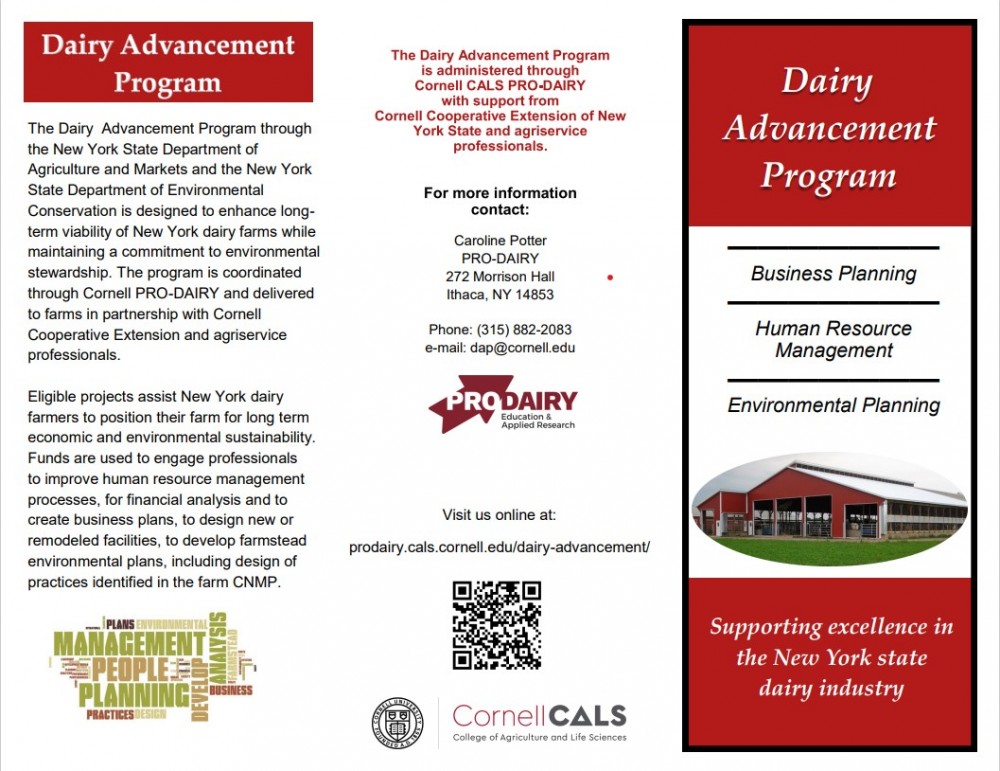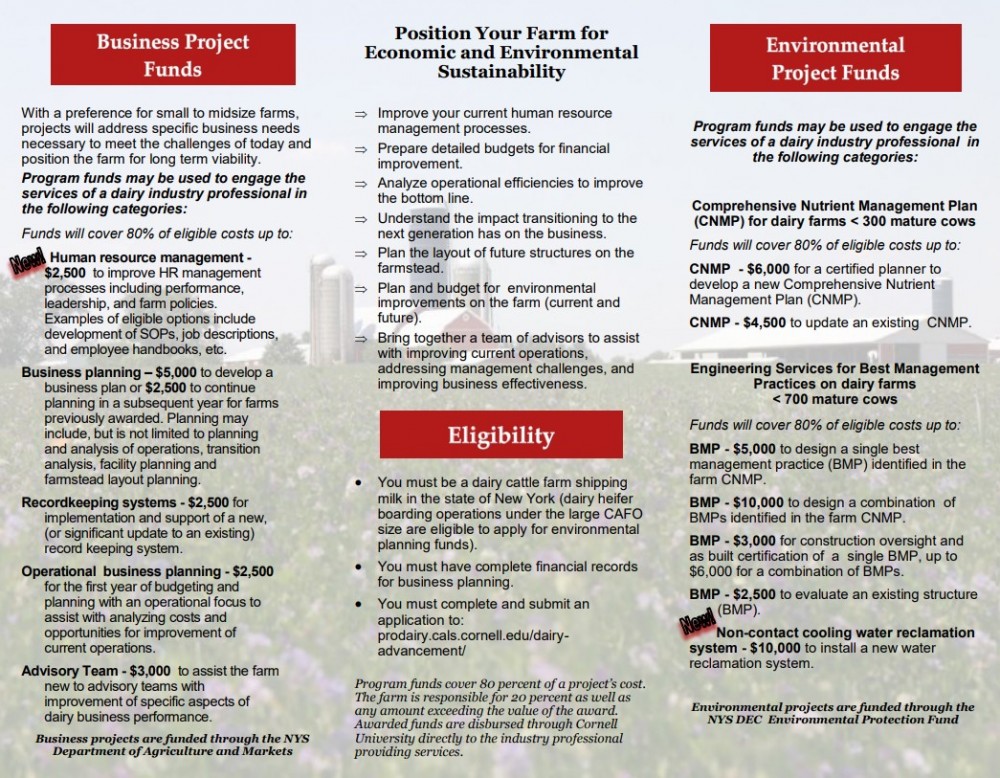A Farm Advisory Team Can Help You Succeed
A Farm Advisory Team Can Help You Succeed
Chris Zoller, Extension Educator, Agriculture and Natural Resources, Tuscarawas County, Ohio State University Extension
Managing all the complexities of a dairy farm is no easy task. Weather, animal nutrition and health, crop variety selection, managing people, and monitoring financial performance are just a few of the items that add to the complexity. Fortunately, there are several people available as a team of advisors to help you address the challenges and contribute to your success.
Farm Advisory Team
You likely are meeting and working with many of the potential team members already, just on an individual basis. Your veterinarian, nutritionist, agronomist, lender, attorney, and Extension Educator are a few of these people. Each brings their own set of knowledge, skills, and experience to the table to analyze, diagnose, and provide recommendations to address challenges and the direction of your farm.
Initial Planning
Before assembling your advisory team, develop a list of questions, issues, or concerns you want assistance and guidance from your team members. Divide the list into immediate, short-term (less than one year), medium-term (one to five years), and long-term (greater than five years) goals or issues you wish to address.
If you've never done it before, completing a Strengths, Weaknesses, Opportunities, and Threats (SWOT) Analysis of your farm business may be beneficial. This analysis can help guide discussion and direction.
This is also a time to consider who would be a good person to be the facilitator of the team. A good facilitator supports the use of teams, is a good listener, can work with groups, and is well organized. The role of the facilitator is to guide discussion, keep the team focused on their task, and communicate accomplishments and expectations. The facilitator may also assist with periodic check-ins to monitor progress.
Getting Started
Forming the advisory team is not difficult. Again, you are already working in some capacity with each potential team member. The goal here is to bring all the members together at the same time.
After you have developed your list of goals and completed your SWOT Analysis, now it's time to invite team members. A phone call or personal visit with each member is suggested. This allows you to discuss your reason(s) for inviting them, what you hope to accomplish, gauge their level of interest, discuss time commitment, and identify potential meeting dates and times. A call or face-to-face visit with the person who you identify as the facilitator is important. This person is key to the success of the team and needs to understand their role and expectations.
First Meeting
A written agenda is strongly encouraged. This helps everyone see the task at hand and keeps the team focused and on track.
Begin the first meeting with an introduction of members, including their role. While most may think they have a good understanding, a brief overview of your farm operation gets everyone on the same page. Describe farm size, cow numbers, animal housing, etc.
Following introductions, share with the team your SWOT Analysis and the concerns you've identified previously. Allow members to review, digest, and react to these. The beauty of an advisory team is that each member will approach an issue from a different perspective and provide possible solutions that others might not have otherwise considered. Remember…two heads are better than one. The facilitator will take notes and lead much of the discussion among members.
Wrapping Up
As the established ending time approaches, the facilitator needs to summarize the discussion, reference notes they have taken, and identify next steps. The next steps include the date, time, and location for the future meetings and tasks to complete (along with the person responsible). These should be sent to all team members. Depending upon the complexity and number of topics you wish to address with the team, the frequency of meetings may vary. I believe you should meet with your advisory team at least once a year.
Summary
Farm advisory teams can bring together those with diverse knowledge and skills all focused on your long-term success. Devote time to completing a SWOT Analysis, developing your goals and areas of concern, and invite team members to join you.
If you have questions about advisory teams, I encourage you to consult the resources listed below. Your local Extension Educator is a great resource to help you navigate the process.
Sources
An Advisory Team Approach to Your Farm Management, ResearchGate, https://www.researchgate.net/publication/273124170_An_Advisory_Team_Approach_to_Your_Farm_Management
Conducting a SWOT Analysis of Your Agricultural Business, Ohio State University Extension, https://ohioline.osu.edu/factsheet/anr-42
Dairy Advisory Teams Tools for Facilitators, Penn State University Extension, https://extension.psu.edu/dairy-advisory-team-tools-for-facilitators
What are Dairy Advisory Teams? Penn State University Extension, https://extension.psu.edu/what-are-dairy-advisory-teams
___________________________________________________________________________________________________________________________________________________________________________________________________
DAP Funding is available for Advisory teams! This is a reminder that there is still Dairy Advancement Program Funding available to assist the farm's new advisory teams with improving specific aspects of dairy business performance. You can apply for up to $ 3,000.
In addition to advisory teams, DAP has funds available to improve recordkeeping (Quickbooks, DairyComp, etc.); go through the Business Planning process to prepare for succession, expansion, or changes; or develop and implement comprehensive nutrient management plans. DAP is funded by NYSDAM and NYSDEC. You can contact Katelyn Walley-Stoll or Camila Lage in Southwest New York to apply or learn more. DAP funds cover 80% of the cost of the project up to $2,500 - $10,000, depending on the project.
If you want to learn more about how to put together an advisory team or more information on DAP funds, please feel free to call or email Camila Lage at 607-422-6788 or cd546@cornell.edu


Upcoming Events
WEBINAR - Automated Milking Systems Efficiency: Balancing Focus on Individual Cows and System Optimization
May 8, 2024
Please join Cornell the SWNY team and MSU Extension for our talk with Dr. Pablo Silva Boloña on improving efficiency of Automated milking systems by focusing on milking settings for individual and group success.
Broiler Field Day at Sunny Cove Farm
June 6, 2024
Alfred Station, NY
Join us for a field day to explore broiler production, processing, and finances. Meghan Snyder of Sunny Cove Farm will be our host. She raises small batches of organic broilers, processing them on-farm under the 1,000 bird exemption.
Cornell Seed Growers Field Day
July 2, 2024
Ithaca, NY
Please Save the Date for the Cornell Seed Growers Field Day to be held the morning of July 2nd. The event will be held at the NYSIP Foundation Seed Barn, 791 Dryden Rd., Rt. 366, Ithaca, NY.
Announcements
No announcements at this time.





